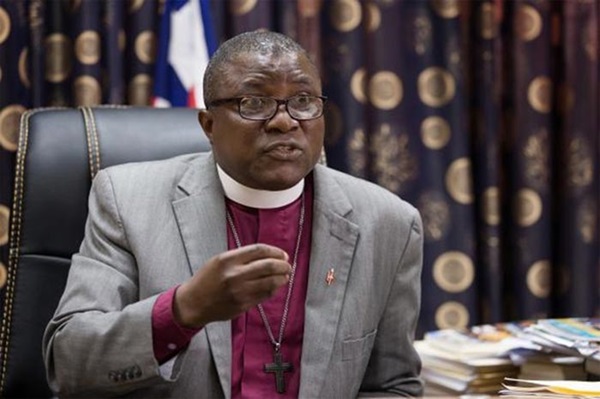Since taking office at the beginning of 2017, Bishop Samuel J. Quire Jr. has been getting a feel for the job as spiritual leader for Liberia's United Methodists and crafting his vision for the church. Your faithful support of the Episcopal Fund apportionment helps pay bishop's salaries, office and travel expenses, and pension and health-benefit coverage.
Bishop Quire was in a unique position as the administrative assistant to his predecessors, Bishop John G. Innis, who retired in 2016, and Bishop Arthur F. Kulah, who served as interim bishop until Quire's election. Working so closely to the bishop's office every day gave Quire insights into the job.
"As an assistant, you get to advise, but the bishop has to make the decisions, not you," he said. "Now I'm sitting in the driver's seat and sometimes it's very challenging to do the right thing."
One area that Quire placed immediate emphasis on is the need for the Liberian church to be more self-sufficient. He believes rural development is a key way to make that happen.
"I'd like to see a church that is vibrant, spiritually awake, evangelistically functional and self-sustaining, especially in the area of agriculture. When I travel in the interior and rural areas of our conference, I would like to see farms that are being operated by the church. We want to stimulate the need for us to go back to the soil."
Though much of Liberia's population farms, the country still imports half of its staple food requirements, according to USAID. Many farmers lack knowledge of the most beneficial farming techniques, such as crop rotation or water and soil management. Compounding the problem, only about 6 percent of Liberia's roads are paved, and unpaved roads frequently wash out during the May-November rainy season. That limits farmers' ability to transport produce to more valuable markets.
To address some of these issues, one of Quire's first acts as bishop was to rebrand the Liberia Conference's United Methodist Church Agriculture Program. Now called the United Methodist Rural and Agricultural Development Program, the initiative has an increased focus on outreach to farmers in the country's most rural parts.
"Our vision is that by 2029 we'll have an agriculture program that will surpass pre-war levels, that will be instrumental in generating income and empowering the conference as a whole," says the Rev. Joseph Theoway, program director.
"For over 185 years as an annual conference we haven't been sustainable. Now I'm saying to our partners, 'Help us to help ourselves. You have given us fish for a very long time; come help us to fish so we can be good fishermen,'" said Quire.
In addition to his agricultural focus, Quire sees other areas where the conference could move toward sustainability, such as developing housing for rent or engaging in microfinance.
Even as the episcopal leader for the area, Quire knows he cannot lead without a great deal of support.
"I'm just one person; I need a team of leaders," he said. "In the church, we don't have jobs to offer people, but we have ministries. Every position you hold, you've been called by God to do ministry."
Joey Butler, multimedia producer/editor for UMCom
One of seven apportioned giving opportunities of The United Methodist Church, the Episcopal Fund pays for bishops' salaries, office and travel expenses, and pension and health-benefit coverage. Please encourage your leaders and congregations to support the Episcopal Fund apportionment at 100 percent.





